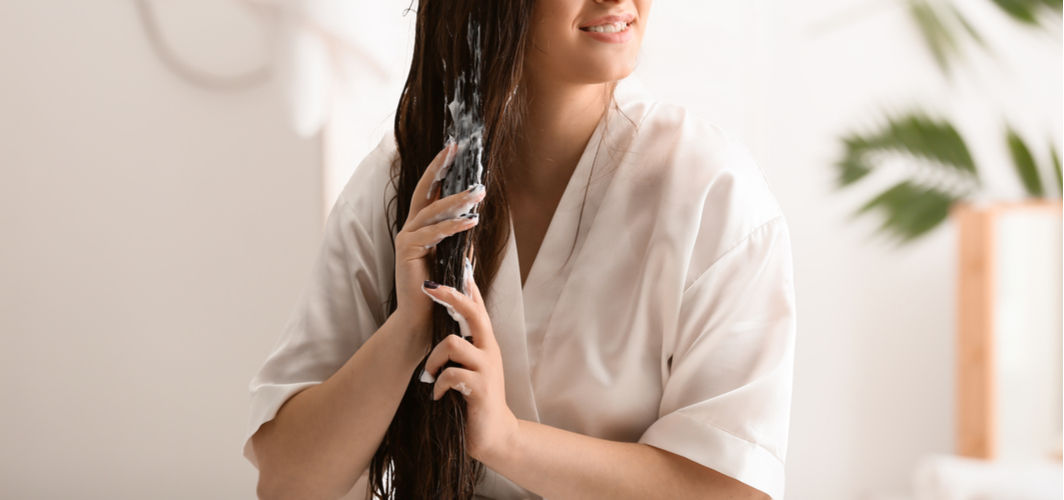Healthcare Essentials
A Guide On Choosing The Best Shampoo For Your Hair
4 min read
By Apollo 24|7, Published on - 01 April 2022, Updated on - 16 July 2024
Share this article
0
23 likes

While genetics play a major role in determining the hair type, it is equally important to use the right products to maintain the length, volume, and texture of the hair strands. Most often, we end up buying the wrong hair products as we are unaware of our hair type. Let us understand how one can choose the right products for their hair.
How to identify hair type?
Based on the shape, the different types of hair include: straight, wavy, curly, and coiled. The density of the hair can also vary from thin to thick. While people with thin hair volume can see their scalp while brushing their fingers through the hair, those with thick hair volume have densely packed hair.
Based on greasiness, the different hair types are:
- Oily hair: People with oily hair have greasy oil patches throughout their scalp.
- Dry hair: People with dry hair have no oil deposit on their scalp, which indicates a lack of hydration.
- Combination hair: People with combination hair experience oil deposition on some specific regions of the scalp, while the rest of the scalp remains dry.
Which shampoo should one use?
Shampoos are an essential part of hair care as they help remove dirt, oil, and other build-ups from the hair and scalp. It is important to understand that not all shampoos are suitable for everyone. Therefore, one should decide on their shampoo depending on the hair type.
- Shampoo for combination hair: People with combination hair should use a sulphate-free shampoo, which can smoothen and clean the hair without removing natural oils from the strands. They can wash their hair once or twice a week.
- Shampoo for dry hair: People with dry, brittle, and frizzy hair should use shampoos infused with nourishing creams (shea butter), oils (coconut or olive) or proteins to keep the hair strands moisturised. They must use an extra moisturising conditioner after every wash.
- Shampoo for oily hair: The shampoo for oily hair should have astringents and lauryl sulphate to remove the excess oil from the scalp. People with oily hair should avoid frequent conditioning of hair as it can clog the follicles.
- Shampoo for thin hair: Shampoos that contain humectants such as panthenol and wheat protein can help thicken the hair strands and prevent hair breakage.
- Shampoo for curly hair: Curly hair requires sulphate-free shampoos, with extra proteins and silicones to restore bounce and moisture to the strands.
- Shampoo for coloured hair: Hair treated with chemicals need a shampoo that protects them from harsh sun rays and prevents colour from fading. The use of leave-in conditioners containing zinc oxide can protect the hair from UV rays. People with coloured hair should avoid the use of sulphate-containing shampoos as they can open up the hair cuticles and allow the colour to leave faster.
What to avoid while choosing shampoo for the hair?
While shampoo can help improve hair health, some ingredients in the shampoo can cause inflammation and irritation on the scalp. Ingredients that should not be present in shampoos include:
- Sulphates: Sulphates are very commonly found in most shampoos as it helps in removing dirt and oil from the scalp. However, sulphates can be harsh for people with dry and frizzy hair and can result in breakage. Sulphates can also increase the risk of premature greying of hair.
- Sodium chloride: It is used to improve the consistency of the shampoo. However, sodium chloride (commonly known as table salt) can irritate the scalp and eyes. Sodium chloride can also dehydrate the hair strands resulting in dryness and breakage of hair.
- Paraben: Parabens are preservatives added to shampoos to increase the shelf life. However, parabens can trigger skin allergies such as dermatitis and rosacea.
- Alcohol: Different types of alcohol are added to the shampoo as they help lock moisture in the hair. However, a high percentage of alcohol can irritate the scalp and dehydrate the hair, resulting in dry and frizzy hair.
- Formaldehyde: Formaldehyde is added as a preservative in shampoos. However, it is a carcinogen (substances that can result in cancer) and its high concentrations can cause allergy and itching.
Recommended reading: Hair Loss: Top Causes and How to Deal with It
Conclusion
To ensure proper hair health, one should know their hair type as it helps in deciding the required hair-care products. People should avoid shampoos that contain harmful ingredients such as sulphates, sodium chloride, and Parabens. However, those dealing with excessive dandruff, persistent hair fall, or other issues should consult a dermatologist before investing in a hair product.
Healthcare Essentials
Leave Comment
Recommended for you

Healthcare Essentials
Scientists Uncover The Mystery Behind Living Past 100 Years!
Scientists have discovered a potential "immunity secret." A new study shows that people who live to be 100 have a unique composition and activity in their immune cells. This enables them to live longer and protects them from age-related diseases.

Healthcare Essentials
All You Need To Know About Caring For Oily Skin
Using appropriate skin care products, keeping the skin hydrated, and maintaining a healthy diet can help reduce excess oil discharge from the skin.

Healthcare Essentials
Pros and Cons of Using Hair Conditioners
Experts believe that maintaining a proper hair routine involving the use of a shampoo and conditioner can help manage frizzy and dull hair.
Subscribe
Sign up for our free Health Library Daily Newsletter
Get doctor-approved health tips, news, and more.
Recommended for you

Healthcare Essentials
Scientists Uncover The Mystery Behind Living Past 100 Years!
Scientists have discovered a potential "immunity secret." A new study shows that people who live to be 100 have a unique composition and activity in their immune cells. This enables them to live longer and protects them from age-related diseases.

Healthcare Essentials
All You Need To Know About Caring For Oily Skin
Using appropriate skin care products, keeping the skin hydrated, and maintaining a healthy diet can help reduce excess oil discharge from the skin.

Healthcare Essentials
Pros and Cons of Using Hair Conditioners
Experts believe that maintaining a proper hair routine involving the use of a shampoo and conditioner can help manage frizzy and dull hair.